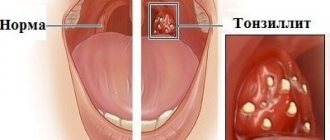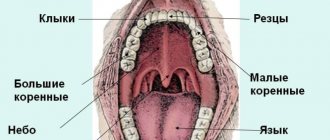Causes and mechanism of dry cough in a child
Coughing is a protective mechanism during which foreign bodies, mucus, and waste products of viruses and microbes are removed from the respiratory tract. It occurs when chemical or physical irritation of special sensitive receptors, which are responsible for a timely response to foreign bodies entering the respiratory tract. Nerve impulses are transmitted to certain structures of the brain, and then to the cough center. As a result, a cough occurs, which can be dry or wet. A dry cough greatly exhausts the child, deprives him of strength, and interferes with sleep. Children refuse to eat, cry for a long time, and with a protracted course of the disease, which lasts weeks and months, diaphragmatic and inguinal hernias may even form due to increased intrathoracic pressure and strong tension in the abdominal wall.
The main causes of dry cough in children:
- irritation of the respiratory tract of an infectious, allergic nature, due to the ingress of foreign bodies or exposure to aggressive chemical components;
- severe squeezing of the throat;
- irritation of receptors in the mediastinal area;
- left ventricular heart failure;
- bronchial asthma, chronic bronchitis;
- taking certain medications;
- inflammation of the esophageal mucosa.
Only a qualified specialist can know how to treat a dry cough in a child and what to do to combat the underlying disease, as well as to prevent the development of complications. Do not delay treatment, especially if the child’s dry cough does not go away, has a paroxysmal or “barking” character, is accompanied by wheezing, deterioration of health and severe weakness. A long-term cough in children reduces the quality of life of both the baby himself and his parents, who do not they know what to give the child to make him feel better. Experimenting with medications in childhood is extremely dangerous - do not self-medicate, seek help from a qualified doctor.
Symptoms of dry cough in children with various respiratory diseases
A dry cough in children indicates that the airways are not cleared of mucus, which means it stagnates, which can lead to bronchitis or pneumonia. It is easy to recognize: a sore throat, the inability to cough, attacks of dry cough in a child that are repeated over and over again. This cough gets worse in a warm room and immediately after the baby goes to bed.
acute respiratory infections and acute respiratory viral infections
With acute respiratory infections, acute respiratory viral infections, a dry, non-productive cough causes a lot of suffering to the child. The temperature may rise to high levels, and then parents have to call emergency help to normalize the baby’s condition. A dry cough irritates the pharyngeal mucosa and increases blood pressure.
Respiratory viral diseases in childhood are accompanied not only by cough, but also by other characteristic signs:
- body aches;
- headaches;
- stool disorder;
- runny nose;
- hoarseness of voice;
- enlarged pharyngeal tonsils;
- nasal congestion;
- increased temperature;
- enlarged adenoids;
- chills, signs of fever;
- loss of appetite;
- redness of the throat, the appearance of a white coating on the tongue.
The younger the child, the more difficult it is for him to tolerate viral infections such as acute respiratory viral infections and acute respiratory infections, which, without treatment, can be complicated by diseases of the upper respiratory tract, which, as a rule, occur chronically, with frequent exacerbations and persistent cough. It can be quite difficult to cure. Every parent strives to help their child by purchasing remedies for dry cough in children, but it is better not to joke with medications. Only a doctor should prescribe them.
Bronchitis and tracheitis
Tracheitis and bronchitis are common complications of acute respiratory infections, influenza, ARVI and other viral infections. Sometimes diseases run their course on their own, but this is rare. With tracheitis, infectious pathogens cause inflammation of the trachea - the tube connecting the bronchi and larynx. The cough with this disease is dry, painful, and worsens at night and in the morning. The temperature remains within normal limits, and chest pain may occur. With bronchitis, the cough is usually dry in the first days of the illness, and then it becomes moist, and sputum begins to actively drain. Additionally, the child experiences a runny nose, sore throat, headaches, weakness, and increased fatigue.
Laryngitis and pharyngitis
With laryngitis (inflammation of the laryngeal mucosa), the child’s cough is dry, paroxysmal and painful, sputum is difficult to separate due to its increased viscosity. In this case, a sore throat may develop, and a headache often appears. With an exacerbation of laryngitis, the body temperature often rises, the tonsils may be swollen and red, as well as the vocal cords. Pharyngitis (inflammation of the pharynx) occurs with a dry cough, redness of the back of the throat, increased temperature and a sore throat. In most cases, sputum is not produced, unless the disease occurs against the background of other infections.
Why are purulent plugs in the throat dangerous?
If traffic jams and inflammation are not eliminated, the disease can affect the heart and kidneys. Inflammation can affect joints and skin. When pyogenic bacteria penetrate from the throat into the blood, it can become infected and spread the infection to other tissues and organs. There are also known cases of replacement of lymphatic tissues in the palatine tonsils with scar tissue.
Common complications are neck cellulitis and peritonsillar abscess. In the first case, infectious inflammation of the subcutaneous tissue of the neck occurs and, in the absence of surgical treatment, there is a high probability of death. In the second case, the inflammation spreads to the fiber surrounding the tonsils and causes an acute inflammatory process.
How to treat a dry cough in a child
Most often, a persistent cough in children is caused by colds. There is nothing terrible about them, and if you act correctly, the disease goes away within about a week. But a child with a cold does not feel well, and any mother wants to do everything possible to alleviate his condition and prevent the development of complications. Here are some simple tips on how to cure a child's dry cough.
1. Give plenty of fluids
Warm, generous drinks are a simple, well-known and very effective remedy. The liquid thins mucus and allows the body to remove bacteria from both the bronchi and the nasal cavity. In addition, warm drinks soothe a sore throat. What is best to give a child for a dry cough? The ideal option is simple clean water. Homemade fruit drinks diluted with half and half water (so as not to be too sweet) and fruit juices are also good.
2. Humidify the air
Dry air during the heating season can itself cause dry mucous membranes and cough. Therefore, it is advisable to have a humidifier at home. Other possible measures are placing wet towels on the radiators and wet cleaning without the use of chemicals. You can sit with your child for half an hour in the bathroom with hot steam. Daily long bathing (of course, not during illness) can serve as a good preventative against drying out the mucous membranes and possible coughing.
3. Try honey
Honey contains antibacterial substances and components that act as antioxidants. It is important to remember that honey is a highly allergenic product, so children from one to five years old should be given no more than half a teaspoon of honey daily.
4. Take Doctor MOM® syrup
When a child has a dry cough, doctors often recommend syrups and tinctures, especially those based on medicinal herbs. They facilitate expectoration and speed up the clearing of the bronchi. Doctor MOM® syrup thins sticky mucus, improves its separation and relieves inflammation. The medicine contains exclusively herbal ingredients, including extracts of aloe, basil, medicinal ginger, turmeric and licorice. This allows you to take it for a long time - up to two to three weeks - with minimal risk of side effects. Children's expectorant syrup is prescribed for laryngitis, bronchitis, tracheitis, pharyngitis and laryngotracheitis, as it has bronchodilator, mucolytic, expectorant and anti-inflammatory effects. The syrup is indicated for children from three years of age.
5. Do not take medications on your own or without a doctor’s recommendation that suppress the cough reflex and do not help remove phlegm.
It is very difficult to watch how a child suffers and suffocates from a dry night cough. Therefore, the desire to give him a medicine that stops this unpleasant syndrome is understandable and natural. However, in no case should you do this on your own! Drugs that suppress the cough reflex, without promoting the removal of sputum, can only be prescribed by a doctor and in a number of special cases: when coughing after whooping cough, pleurisy (inflammation of the pleura - the outer lining of the lungs) or caused by external factors. A qualified specialist, having studied the history, examination and diagnosis, can determine how to treat a dry barking cough in a child. Self-medication with drugs that suppress the cough reflex and do not help remove phlegm is dangerous!
6. Massage and physical therapy
Whether it be physiotherapy from a district clinic or a careful massage from a specialist with a medical education, the result should be the same - activation of metabolic processes, as a result of which sputum begins to be more easily separated and removed from the body. You can also do special breathing exercises under the supervision of an instructor.
IMPORTANT!
In addition to colds, the cause of cough can be asthma, allergies, diseases of the central nervous system, chemical poisoning, so before starting treatment, the child should be shown to a pediatrician. Only a doctor can make a diagnosis and prescribe treatment, which includes taking medications.
A prolonged dry cough that does not bring relief may be complicated by:
- spontaneous emphysema of the mediastinum;
- viral pneumonia;
- chronic bronchitis;
- pneumothorax;
- anxious sleep, insomnia;
- disturbance of psycho-emotional balance in a child.
It is necessary to treat dry cough in children on time and with proven means, preferably as natural and safe as possible. Seek help immediately if you notice streaks of blood in the sputum - this may indicate the development of internal bleeding. You should also be alert to such signs as a very high temperature that persists for several days or more, the presence of wheezing when breathing, a “barking” cough, severe diarrhea syndrome, and a dry cough that appears in the child before vomiting.
Disease prevention
You can prevent sore throats and avoid their recurrence by following simple tips on preventive measures. It is important to treat teeth and gums in a timely manner, and do not forget about daily hygiene and rinsing your mouth after eating. Every day you need to drink at least two liters of water, monitor the condition of your nasal cavity and dress for the weather.
A complete cessation of smoking will be very useful; nicotine smoke toxins affect lymphoid tissues and can aggravate the patient’s condition. The same applies to alcohol, which burns the tonsils and aggravates the inflammatory process. It is important to take care of proper and balanced nutrition so that the body receives a complex of important vitamins and elements.
If you have already identified purulent plugs in your throat, be sure to consult a doctor as soon as possible. Timely assistance from a specialist will help avoid complications dangerous to the body!









